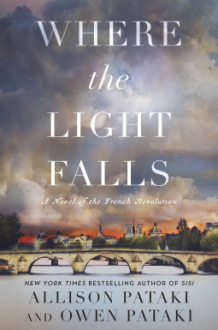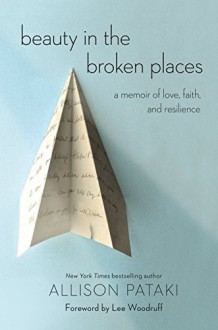
Where the Light Falls, Allison Pataki, Owen Pataki, authors; Bruce Mann, narrator
When the book begins, it is three years after the 1789 storming of the Bastille, in the winter of 1792. Readers witness the public execution of the Marquis de Valière who dies with dignity. From what we learn, his only crime is his noble birth. The reign of terror is soon to begin.
The Marquis has two sons, Remy and Andre. Andre falls in love with Sophie de Vincennes, the niece of General Murat who is, for some reason, an enemy of Andre de Valière. Recently widowed, Sophie’s uncle has brought So-So to Paris for what he claims is her protection. Sophie had been married to Count Jean-Baptiste. While attending a party, she meets and falls in love with Andre, and he is completely smitten with her, as well.
Their love is thwarted because of the political situation in France. The country is going through growing pains as it throws off the yoke of the nobility, including the King and his wife and anyone who had anything whatsoever to do with the aristocracy. The people are angry and hungry for bloodshed. They want revenge for what they perceive as the injustices done to them by the monarchy.
George XVI is executed along with his wife, Marie Antoinette and chaos begins to overcome Paris as the people thirst for vengeance and a desire to see their perceived enemies executed, beheaded, in order to pay for their crimes.
Andre has given up his title and become a Captain, fighting for liberté, égalité, fraternité, in the service of the French military. He soon discovers, along with Jean-Luc St. Clair, an attorney working for the new revolutionary government, that the motto seemed meant only for the lower classes. Those of noble birth were not entitled to the fair trials of the justice system. He as a former nobleman is in danger. There are those who harbor deep resentment toward him regardless of how he fights for them with honor and valor. When he becomes acquainted with a certain group of councilmen, in Paris, he discovers how brutal they really can be, and in particular, he discovers the brutality of one attorney named Guillaume Lazare and the General who is Sophie’s uncle, Murat.
For the next several years, the authors take the reader through some of the more momentous events in the history of France, the battles, the conquests and the rise of their future Emperor Napoleon Bonaparte and his wife, Josephine, the Empress. As the story plays out, the reader is faced with the tension and danger that the revolution forces upon Jean-Luc and Andre Valière. It feels fraught with fear.
The atmosphere of the Revolution, the anger of its citizens and the rancor felt by those who deeply resented the nobility was felt on every page. The effort of those whose sin was only incurred by birth, to rectify their perceived wrongdoing was ignored by many in the mobs who lusted after their blood believing even their progeny must be prevented from contaminating the world. The innocent and guilty both faced the guillotine. Just the hint of an accusation was enough to condemn a victim to death. No proof was required. Vengeance took center stage during this period, and it did not end until Maximilien Robespierre, a Jacobin who was associated with the Reign of Terror, was himself beheaded.
In the end, with the rise of Napoleon Bonaparte and the death of King George XVI, the French replaced a King with an Emperor, barely noticing the irony of their actions.
The authors have taken this history of the French Revolution and woven into it a story of intrigue, betrayal, grudges and vendettas and surrounded them with a romantic story of two families dedicated to supporting France, placing them in the thick of things to show how the Revolution affected those accused of crimes and on the other hand, those accusing them. The reader may well be struck by the horror of the “blood lust” that accompanied the fight for democratic principles and equality and also by how easily it is to lose the sense of right and wrong, good and evil, justice and injustice when the mob rules and hate and anger govern behavior. This narrative is presented in descriptive, emotionally wrought sentences that make it hard for the reader to put the book down. It is exciting, as well as interesting to watch, as the French citizens attack each other without truly noticing their own complicity in wrongdoing, until they begin to fear for their own fate, as the developing rules and regulations might also offer them no recourse to any accusations.
Although some of the events and characters are real, some are only based on real events and characters, according to the authors. They have also taken liberty with regard to the timing of some events.
In the modern France, The Marseillaise is still the National Anthem, and the belief in liberté, égalité, and fraternité is going strong. Bastille Day symbolizes the birth of their democracy and is celebrated every year on July 14th, commemorating the uprising of the common people in 1789.
In some ways, I thought the authors got caught up in the present day politics as they were essentially presenting a case against class distinctions and for the civil rights of all, but by showing the tactics used to get from point A to point B, they also showed that the methods used and results attained were not always pretty or just. The injustice of racism was introduced using the characters of General Dumas, a man of mixed race and questionable parentage, and by Andre’s Egyptian friend who was apparently of the Muslim faith. They, coincidentally, were the ones who essentially saved Andre when he was in danger, while those who were paler of skin were portrayed as evil, like Murat and Lazare. Also, there were a bit too many near death experiences for Andre which lacked some credibility. However, I learned of common abusive practices of the nobility, that I had been unaware of, like the “droit de seigneur”, the right of the nobleman to take the bride the night before her wedding. In addition, on the positive side, the book inspired me to do some further research into the French Revolution since my romanticized memory of it did not include the idea of women being involved in the effort to end the Monarchy or very much knowledge about the Reign of Terror. My memory was more about the Marseillaise and the celebratory events surrounding Bastille Day, having once witnessed the parades in Paris. I was unaware of the fact that celebrating religion was forbidden in favor of reason, during the time of the Revolution and did not realize that honorific terms were forbidden. Everyone was called by the term citizen or citizeness. A book that teaches is a good book. The epilogue was important because the authors explained to the reader which characters were real, which were made up out of whole cloth and which were based on real people.
The events of the French Revolution seem eerily to have presaged some of the events of today, with mob rule dominating the news and those committing violence declaring themselves honorable while damning those they make their victims. Vengeance, anger and hate, when harnessed, may cause good people to do bad things. The authors did a good job in creating the mood during the time of the Revolution, and in so doing, created an image in my mind too similar to today’s events. The storming of the Bastille and the storming of our political rallies are both related to blood lust and revenge. Both show people out of control. In the book, Robespierre notes that the people are not inspired by love, but rather by hate. Is that what is happening today as the left accuses the right of all sorts of fantasies that never occurred? Is the fake news of today no better than the cries for the death of innocent people during the Reign of Terror? Are we having our own moment in history which will be remembered in the same way as the Brown Shirts are remembered during the time of The Holocaust? At those times, the people were driven by hunger and fear, hate and anger. Was Robespierre right and prescient in his beliefs?


 Log in with Facebook
Log in with Facebook 







